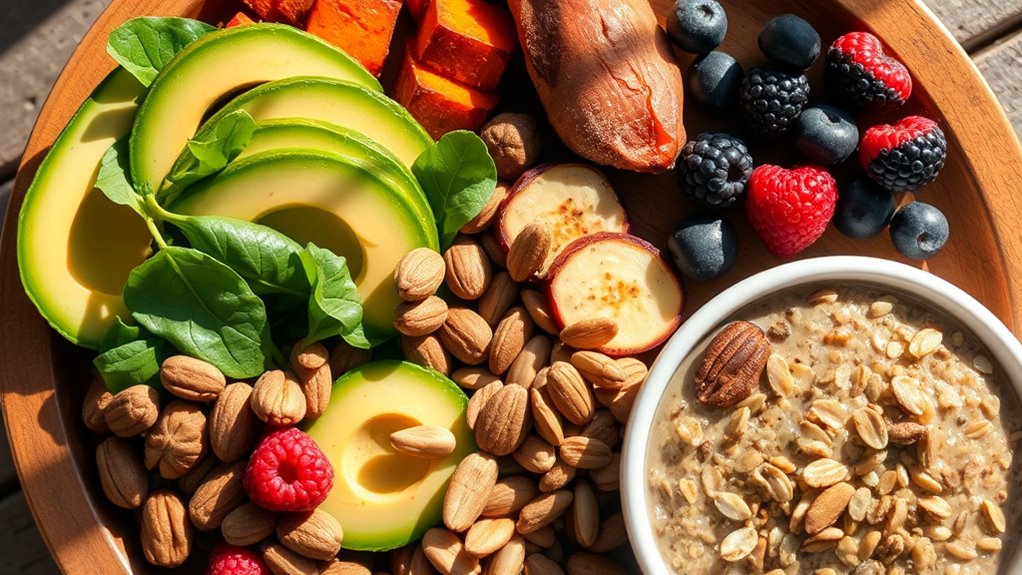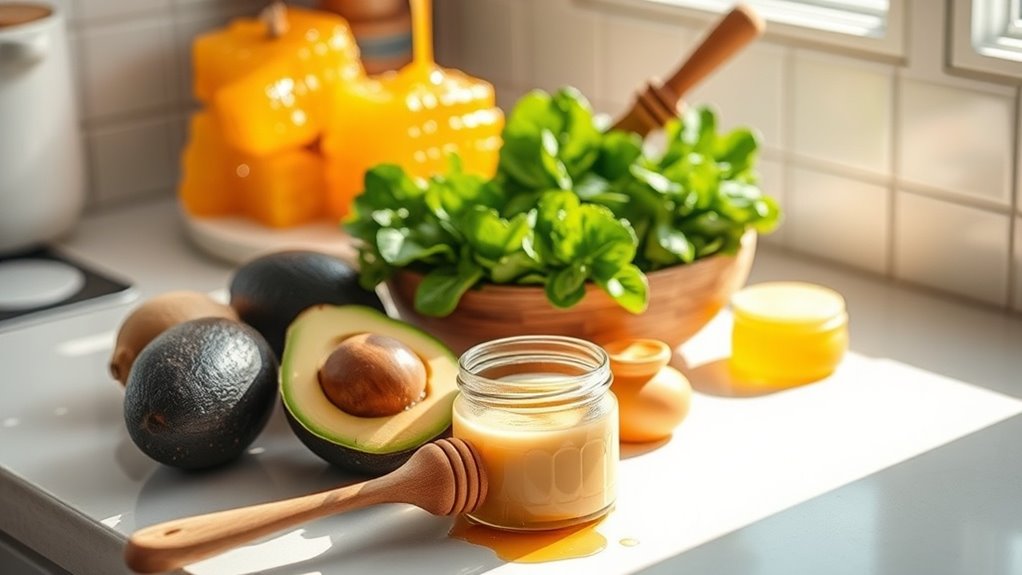What to Eat for All-Day Satiety Without Overeating
To achieve all-day satiety without overeating, focus on high-protein foods like Greek yogurt, eggs, and lean meats. Incorporate fiber-rich ingredients such as whole grains, legumes, and fruits to help you feel full longer. Don’t forget healthy fats from sources like avocados and nuts, which enhance feelings of fullness too. Staying well-hydrated is crucial, as thirst can often be mistaken for hunger. By making these choices, you’ll better manage your appetite and nourish your body—discover more about this!
Understanding Satiety: What Makes Us Feel Full?
When you eat, your body sends signals that tell you when you’re full, but understanding these signals can help you make better food choices.
Satiety foods, like whole grains, fruits, and vegetables, contain fiber and water, which promote fullness. Additionally, foods rich in healthy fats can enhance that feeling. Incorporating fiber-rich ingredients into your meals can help prolong feelings of fullness throughout the day.
Recognizing what satisfies you helps in making healthier, more balanced decisions throughout the day.
High-Protein Foods That Keep You Satisfied
A key component of maintaining satiety throughout the day is incorporating high-protein foods into your meals and snacks. Foods like Greek yogurt, eggs, lean meats, and legumes not only provide essential nutrients but also promote fullness. Research shows that protein increases the release of hormones that signal satiety, helping you feel satisfied longer and reducing the urge to snack unnecessarily. Additionally, including nutrient-dense vegetables in your meals can enhance the overall nutritional profile and support long-lasting energy.
The Role of Fiber in Promoting Fullness
While high-protein foods are essential for satiety, fiber plays an equally crucial role in keeping you feeling full throughout the day.
Incorporating fiber-rich foods helps slow digestion and promotes fullness. Consider adding these to your meals:
- Whole grains like quinoa and oats
- Legumes such as beans and lentils
- Vegetables, especially leafy greens
- Fruits like berries and apples
These options can enhance your overall satisfaction. Additionally, aiming for at least 25 grams of fiber daily will support digestive efficiency and overall health.
Healthy Fats: Why They Matter for Satiety
Incorporating healthy fats into your diet can significantly enhance your satiety levels, as they take longer to digest compared to carbohydrates. Including sources like avocados and nuts can keep you feeling full and satisfied. Check out these healthy fat sources that can help:
| Source | Benefits |
|---|---|
| Avocados | High in monounsaturated fats |
| Nuts | Rich in protein and fiber |
| Olive oil | Contains antioxidants |
| Fatty fish | Omega-3s promote heart health |
| Coconut oil | Medium-chain triglycerides boost energy |
Additionally, healthy fats like those found in avocado not only keep you full but also contribute to your hair’s shine and overall health.
Whole Grains vs. Refined Carbs: Making the Right Choice
Choosing whole grains over refined carbohydrates can make a significant difference in your overall satiety and health.
Whole grains provide more fiber and nutrients, helping you feel full longer.
Consider switching to:
- Brown rice
- Quinoa
- Whole wheat bread
- Oats
These options help stabilize blood sugar levels and reduce cravings, ultimately supporting your weight management goals. Additionally, incorporating more whole foods into your diet can enhance nutrient intake and further promote satiety.
Make the right choice for lasting energy!
Hydration and Its Impact on Hunger Levels
In addition to making nutrient-rich food choices like whole grains, staying properly hydrated plays a significant role in managing hunger levels. Dehydration can often be mistaken for hunger, leading to unnecessary snacking. Here’s a quick breakdown of hydration’s impact:
| Hydration Level | Hunger Sensation | Recommended Intake |
|---|---|---|
| Well-Hydrated | Low | 8-10 cups daily |
| Slightly Dehydrated | Moderate | 6-8 cups daily |
| Dehydrated | High | 4-6 cups daily |
Additionally, maintaining hydration can significantly improve overall vitality and help manage food cravings effectively.




